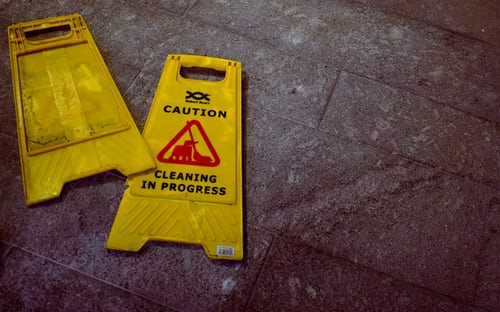 Slip and falls happen all the time. Sometimes, they’re a result of unlucky circumstances with no one but fate to blame. However, they often occur due to unmarked wet spots, faulty or low lighting, torn carpets, or other external factors.
Slip and falls happen all the time. Sometimes, they’re a result of unlucky circumstances with no one but fate to blame. However, they often occur due to unmarked wet spots, faulty or low lighting, torn carpets, or other external factors.
If you slip and injure yourself severely, you’ll likely have high medical bills and lost wages due to missed days of work. If you believe someone else contributed to the circumstances of your fall, you might be able to pursue compensation.
However, liability in a slip and fall case can be challenging to prove. You’ll need to show negligence, which is a five-step process, and contend with Louisiana’s comparative negligence law.
Work with an experienced personal injury lawyer to prepare your case and determine if you can receive compensation.
Liability and Negligence
To hold someone liable for your slip and fall, you’ll need to prove they were negligent, meaning they acted carelessly, resulting in your accident.
As each case is unique, there are few situations where the outcome is clear cut. Before going through the process of proving negligence, your lawyer will want to see all the details of your accident.
Before your consultation, bring in any evidence you have concerning your case. Gather medical records, bills, prescriptions, and referrals. Proof that you’ve missed work or lost wages can help show you incurred financial damages.
Images of the area where the accident took place can be extremely helpful in proving negligence. If you can, take photos immediately following your fall, include pictures that show the possible cause, like dim lighting or a ripped carpet. Return to the area as soon as possible after the accident to take photos if you cannot take them immediately after.
A lack of evidence can make a slip and fall case even more challenging to prove. Particularly in cases involving retail stores, or large organizations, the more evidence, the better your chance of making a successful claim.
Proving Negligence
Once your lawyer has examined your case, they will need to go through the five steps of proving negligence. These steps vary in difficulty but are all essential for a successful claim.
• Proof of Duty of Care
Your lawyer will need to show that the other party owed you a duty of care. Generally, to prevent others from injury, responsible parties must exercise reasonable care in their actions and the environment. Your lawyer will need to determine what ‘reasonable care’ means concerning your case.
If you slipped on an unmarked wet puddle on a company’s property, they likely had a duty to mark the area as unsafe. If your injury resulted from a trip on broken flooring, the business has a responsibility to ensure that their property is well-maintained and safe.
• Breach of Duty
Breach of duty means that someone failed to meet their duty of care. Failing to mark an unsafe area or make repairs is a breach of duty.
• Cause in Fact
In this step, you’ll need to show that your injury would not have occurred without the breach of duty. If the owner had placed a caution sign near the wet spot, you would not have slipped.
• Proximate Cause
Next, your lawyer will use your photos and medical records to prove that the breach of duty caused your injuries, and not something else. For example, if you slipped because of an untied shoelace near the wet spot, you would likely be unable to prove negligence.
• Damages
Finally, you need to have quantifiable damages. You can sue for medical bills, lost wages, pain and suffering, and a wide range of other physical, emotional, or financial damages in Louisiana.
Comparative Negligence
Louisiana’s comparative negligence laws make the process of proving liability even more challenging. These laws mean that both you and the defendant could be partially liable.
Louisiana courts will determine if you partially caused your accident. The percentage of fault determined will be subtracted from your compensation. If a court decides that you were 20% at fault, you will receive 80% of your settlement.
Unlike other states, Louisiana allows you to receive compensation even if you hold more than 50% of the fault.
If you think you have a case, contact Lamothe Law Firm to arrange a free consultation to discuss your claim.









